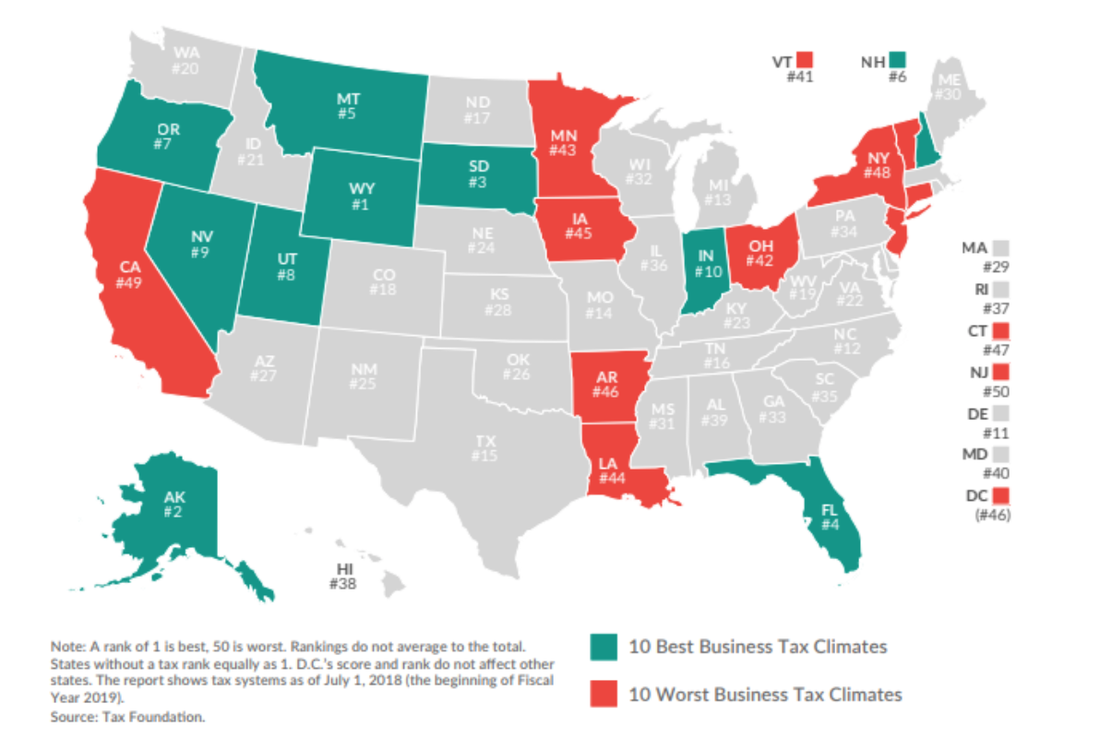|
Texans appreciate living in a state that values liberty, sensible business policy, and, perhaps most importantly, a strong dislike for taxes, which inevitably infringe on the first two values.
But, in comparison with other states, Texas is beginning to lose its competitive edge in business climate as noted in the Tax Foundation’s recently released 2019 State Business Tax Climate Index. The report ranks all fifty states based on the burdens of each state’s corporate income tax, individual income tax, sales tax, unemployment insurance, and property tax. Figure 1 presents the ranking of each state whereby the top-ranked states include either states without at least one major tax, such as the individual income tax, or states that have all major taxes with low rates and broad bases. Meanwhile, poorly ranked states share similar shortcomings such as complex non-neutral taxes and comparatively high tax rates, such as in the three worst ranked states: California (48th), New York (49th), and New Jersey (50th). In this year’s report, Texas’ overall rank took a hit, sliding from 13th best nationwide in 2018 to 15th best for 2019. Yet, the drop is not due to new policy as the state’s individual category scores remained unchanged and actually improved by 8 ranks for Unemployment Insurance. Rather, the new lower overall rank highlights Texas’ stagnation in decreasing its tax burden as other states jump on the opportunity to increase their prosperity from lower burdens. While Texas excels in the category of individual income tax because as it doesn’t have one, the state is consistently held back by its corporate income tax portion of the index, which remains unchanged at 49th, or second worst! This is because Texas’ business tax is a gross receipts-style tax that is costly to comply with and pay. If Texas eliminated this onerous tax, the Tax Foundation has found the state’s business tax climate overall rank could improve to 3rd best. And the Texas Public Policy Foundation and the Legislative Budget Board (LBB) have estimated large economic gains. Texans have been hurt by burdensome local property taxes for too long, with that ranking in the report being 14th worst in the last three years. We know all too well about complexity, high rates, and lack of voter oversight of Texas’ local property tax system. To overcome this over-burdensome system, the Foundation has recently released a report detailing a strategy to slow the growth of state and local government spending in order to use surplus state funds to permanently reduce the school maintenance and operations (M&O) property tax until its eliminated. This would end nearly half of the property tax burden in Texas within about a decade while increasing funding for school districts over time with state taxes that would eventually fund 100 percent of schools M&O. Moving forward, Texas’ elected officials should consider these rankings by the Tax Foundation and other reports when looking for ways to improve the state’s business tax climate so Texans have the best chance to start a new business or gain employment. The Texas model of limited government has contributed to human flourishing, where 24 percent of new civilian jobs created nationwide have been since December 2007, but there’s always room for improvement. https://www.texaspolicy.com/blog/detail/texas-business-tax-climate-needs-improving
0 Comments
Leave a Reply. |
Vance Ginn, Ph.D.
|


 RSS Feed
RSS Feed